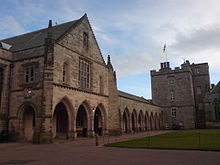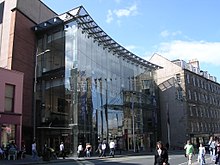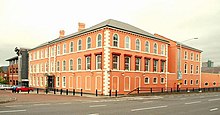2015 United Kingdom general election debates
The second featured Cameron, Miliband, Nick Clegg, Deputy Prime Minister (Liberal Democrats), Nigel Farage (UKIP), Natalie Bennett (Green Party of England and Wales), Nicola Sturgeon, First Minister of Scotland (SNP), and Leanne Wood (Plaid Cymru).
The third debate featured the leaders of the five opposition parties: Miliband, Farage, Bennett, Sturgeon, and Wood.
[1][2][3] Following the result of the election, a survey of 3,019 people, carried out by Panelbase, found that 38% of voters considered the debates to have influenced their voting intention.
As a result of this combined pressure, ITV and the BBC published revised plans in January 2015, including the Greens, as well as the SNP and Plaid Cymru (who only stand in Scotland and Wales respectively).
Sinn Féin sought legal advice,[8] while the Democratic Unionist Party wrote to the BBC and ITV demanding their inclusion.
[28] During October that year, all four main broadcasters, the BBC, ITV, Channel 4 and Sky announced joint plans for multi-platform party leader debates in the run up to the 2015 general election.
Three debates would have taken place within the six-week campaign period, at a time when the parties were to be setting out their policies, to help further engage the audience with the election.
[29][30] In January 2015, ITV and the BBC published revised plans for the television election debates to include seven main UK political parties' leaders.
[33] On 23 February 2015, the broadcasters agreed on three debates:[34][35] On 4 March 2015 David Cameron stated, in what was described as a "final offer",[36] that he would only participate in a single debate, involving the leaders of the Conservatives, Labour, the Liberal Democrats, UKIP, the SNP, the Green Party, Plaid Cymru and possibly the Democratic Unionist Party (DUP).
[2][40] In response to the possibility of Cameron being "empty chaired", Ofcom warned that broadcasters had to be careful about impartiality rules.
[41] The Telegraph and The Guardian, in association with Google and YouTube, then announced that they intended to hold an internet-broadcast live debate, which was planned to feature David Cameron, Ed Miliband, Nick Clegg, Nigel Farage, and Natalie Bennett, and had issued an invitation to the five party leaders.
The Liberal Democrats nominally expressed their intention to participate; however there was concern that the absence of the SNP might prove to be an obstacle.
[44] According to the Conservatives, they were approached with a new 4-programme plan,[44] which was reported to be: The Liberal Democrats accepted these proposals, but Nick Clegg has said he still hoped for a four-way leaders debate involving the Conservatives, Labour, Liberal Democrats and UKIP (as the four main parties as defined by Ofcom).
[51] The party referred to this increase as "The Green Surge", their membership surpassing that of UKIP or the Liberal Democrats by mid-January.
A two-hour debate between seven party leaders was hosted by ITV News anchor Julie Etchingham on 2 April at dock10 studios in Salford.
[70] Sturgeon's Twitter account received most mentions, followed by Farage, Bennett, Miliband, Wood, Cameron and Clegg.
[72] Clegg, despite wishing to attend, was also omitted from the debate, with reports saying Cameron blocked his presence, but Conservative Party sources said the decision was the broadcasters'.
[74] Miliband was judged to have won the debate in a snap poll from Survation, with 35% to Sturgeon on 31%, Farage on 27%, Bennett on 5% and then Wood on 2%.
[77] During the 16 April debate, Nigel Farage accused the BBC of a left-wing bias in selecting the studio audience.
[82] Ed Miliband declared that he would either be Prime Minister with a majority of seats in Parliament or not be in power at all rather than form a coalition with the Scottish National Party.
[84] Nicola Sturgeon was given about half an hour to answer questions from an audience at the BBC's Scotland Headquarters in Glasgow.
[87][failed verification] STV broadcast the first Scottish Leaders Debate in the run up to the general election, which was moderated by then-STV News Political Editor Bernard Ponsonby.
It included six Scottish Party Leaders: The 40-minute debate, with Jim Murphy, Ruth Davidson, Willie Rennie and Nicola Sturgeon, was broadcast on Sunday Politics Scotland.
It featured representatives from the Conservatives, Labour, Liberal Democrats and the SNP,[89] and was hosted by Glenn Campbell at the Festival Theatre in Edinburgh.
The participants were: [94] The first debate featuring the main 5 Northern Ireland parties was broadcast later that evening on the national ITV network after the News at Ten, but not by STV.
A televised debate took place 22 April 2015, It was held at the Royal Welsh College of Music & Drama in Cardiff.
BBC Wales televised debate took place 1 May 2015, It was held at the Sherman Theatre in Cardiff, chaired by Huw Edwards.










